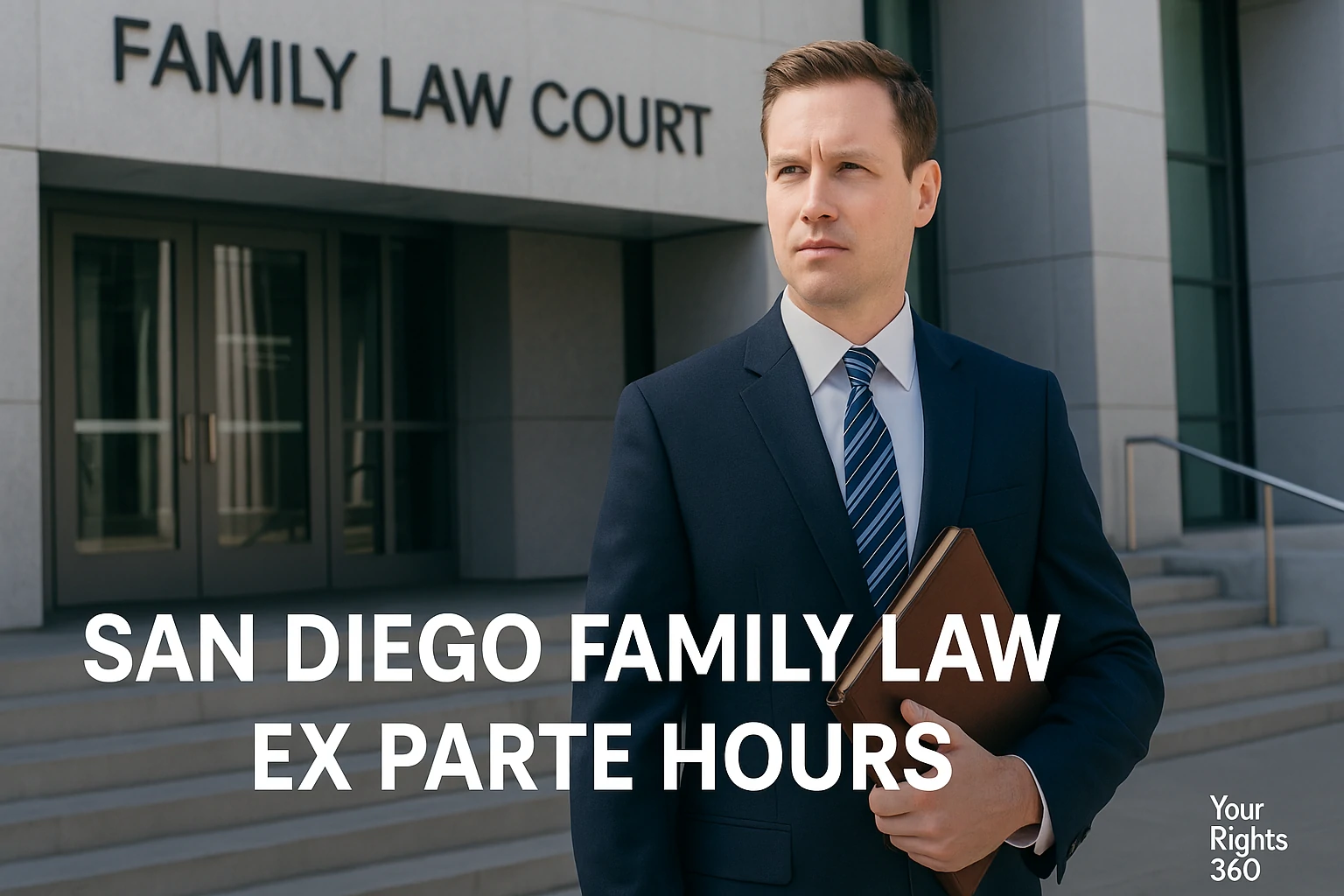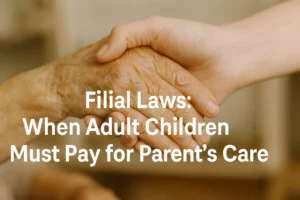Family problems can move fast. Some issues cannot wait. If a child is in danger or a parent plans to leave the state, you need urgent legal help. In these cases, a regular court hearing takes too long. You must act fast. That is where ex parte hearings come in.
Ex parte means one side speaks to the judge without waiting for the other. It is not common, but the court allows it in emergencies. These hearings give short-term relief until both sides can meet at a full hearing. The process is strict. You must follow the rules. If you miss a step, the court may deny your request. That can hurt your case.
San Diego has several family courts. Each one has its own rules and hours for ex parte matters. You must know the correct court, the deadline, and the filing steps. This article explains those details in plain terms. It helps you avoid mistakes. It helps you act fast the right way.
What Is an Ex Parte Hearing?
An ex parte hearing is a fast court process. One side tells the judge about an urgent problem. The other side may not be there. The judge makes a quick decision to stop harm. These orders are temporary. They only last a short time until a regular hearing takes place.
This type of hearing is not for every case. You need to show that something serious may happen if you wait. The court wants proof. It does not give orders without a good reason. Judges want to protect people, not solve minor fights. You must show clear danger or loss.
In family law, common reasons include threats of violence, child safety, or plans to move a child out of state without consent. Property issues may also qualify, but the harm must be serious. Not liking your co-parent’s behavior is not enough. The court needs facts, not feelings.
Who Can Request an Ex Parte Hearing?
You must already have an open family court case. If you do not, the court will not hear your request. You must file the full case first, then ask for emergency help.
Parents, spouses, or legal guardians in family cases can make this type of request. You can ask for orders about custody, visitation, restraining orders, or stopping financial moves. You must explain why the problem cannot wait.
You may file the request yourself. You do not need a lawyer. But you must follow the court’s process exactly. If you miss one rule, the judge may ignore your papers. That can cause delays or harm.
San Diego Family Law Courthouses
San Diego has four main family court branches:
- Central Family Court (Downtown)
- North County (Vista)
- East County (El Cajon)
- South County (Chula Vista)
Each courthouse handles family law. Each one runs its own ex parte schedule. You must file in the court where your case belongs. You cannot choose a different one to save time. Always check the location tied to your case.
Ex Parte Filing Hours in San Diego Family Courts
Every court has a strict deadline for ex parte filings. You must file your papers before 10:00 a.m. the court day before the hearing. If you miss that deadline, you will not get a hearing the next day.
San Diego’s Central Family Court hears emergency matters every weekday. Judges review ex parte cases Monday through Friday. The courtroom opens at 8:30 a.m. It’s best to arrive early and stay prepared.
The North County Courthouse in Vista runs ex parte hearings three days a week. These take place on Monday, Wednesday, and Friday. You must file all documents before 10:00 a.m. the previous court day. Late filings will not be accepted.
The South County courthouse in Chula Vista handles ex parte matters Monday through Thursday. The hearing time is also early morning. You must be on time or risk missing your turn.
East County’s El Cajon branch hears ex parte cases only on Tuesday and Thursday. Like all the others, it uses the 10:00 a.m. filing deadline before the hearing day.
These hours can change during holidays or special court events. Always check the court’s website or call the clerk’s office before you file.
How to File an Ex Parte Request
Filing an ex parte request takes more than filling out one form. You must follow each step with care. The court looks at both what you ask and how you ask.
Start with the right forms. In most family law cases, you need the FL-300 (Request for Order) and the FL-305 (Temporary Orders). San Diego courts may ask for extra local forms. You also must prepare a declaration that explains why you need emergency help.
Arrive early on the hearing day. Judges call ex parte cases first. If you are late, they may skip your name. You may lose your chance to be heard that day.
What Happens in the Hearing?
The judge looks at your forms before the hearing begins. If anything is missing or unclear, the judge may ask questions. If the other party is present, both sides may speak. The court moves fast but still follows rules to stay fair.
If the judge approves your request, you get a short-term order. This order stays active for about two to four weeks. The court then sets a full hearing date. At that hearing, both sides can share full facts and evidence.
If the judge does not approve, your case stays open. You can file again with more details. You may also wait until the full hearing. A denied request does not stop your case. It only means the court needs stronger reasons.
Common Reasons Courts Deny Ex Parte Requests
Many people file ex parte papers and get denied. The reason is often the same—lack of urgency. Judges do not sign orders unless they see a real emergency.
If your child did not show up for a visit once, that may not be enough. If your co-parent said something rude, that may not count. If money is missing but not urgent, the court may delay the hearing. The harm must be serious and must happen soon without action.
You also must follow the process. If you miss the deadline or file in the wrong place, the court may deny your request. Judges expect full steps, not fast guesses.
Final Thoughts
Ex parte requests in San Diego help people handle family law emergencies. These cases move fast. You do not get a second chance if you mess up. Every form, step, and deadline matters.
Know your courthouse. Know your deadline. Explain your case with clear facts. Show why the court must act now. Bring proof. Stay calm. Focus on what protects you or your child.
Even if the process feels hard, the court wants to help. It just needs you to follow the rules. If you do that, you give yourself a strong chance.
You do not need to do it alone. If you feel unsure, visit the San Diego Family Law Self-Help Center. Staff there can guide you. They do not give legal advice, but they explain what you must file and where. You can also speak to a family law lawyer if you want legal backup.
When the stakes are high, act fast. But act smart. That makes all the difference.
Ex Parte Hearing Questions in San Diego
Q. What happens in an ex parte hearing?
A judge looks at one side’s request without waiting for a full court session. The goal is to give quick help in a real emergency. If the case qualifies, the judge may give a short-term order.
Q. When should I arrive at court for my ex parte hearing?
You should get to court at least 30 minutes before it starts. Most ex parte hearings begin at 8:30 a.m. Early arrival helps you check in and stay ready when your name is called.
Q. What if I miss the ex parte filing deadline?
Your papers will not be accepted late. All forms must be filed before 10:00 a.m. the day before your hearing. A missed deadline will push your case to another day or block it from review.
Q. Can I ask for an ex parte order without a lawyer?
You can file the request without legal help. But you must follow every rule and step. Many people visit the court’s self-help center if they need guidance.
Q. Does the court always grant ex parte orders?
The judge signs the order only if the case shows true urgency. You must show clear risk of harm or loss. Weak claims or missing facts will not lead to fast approval.




